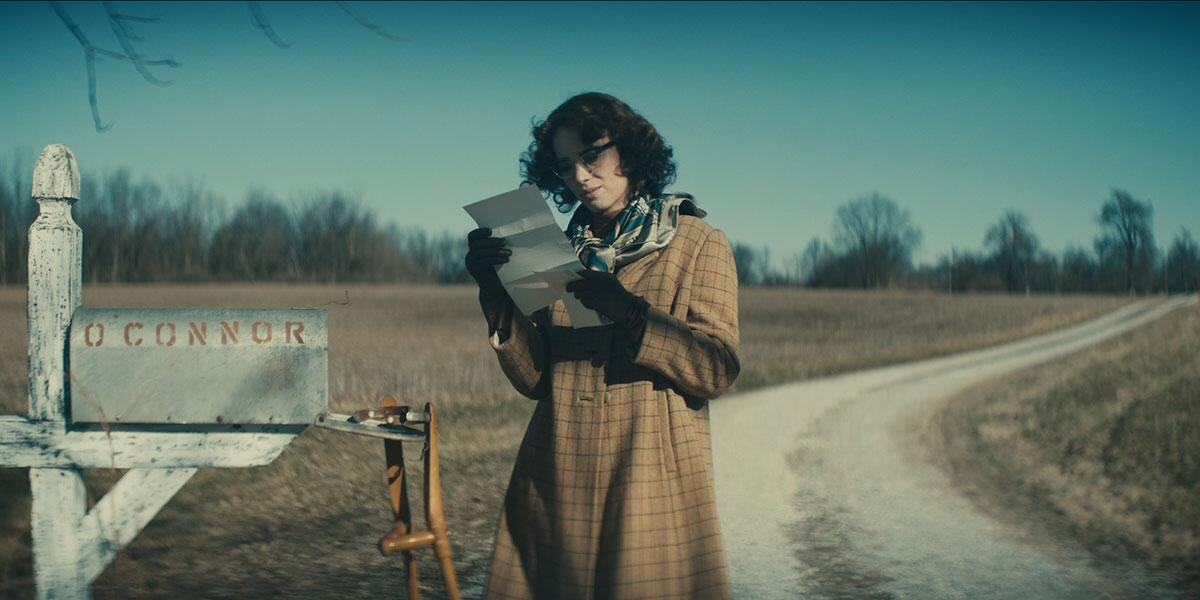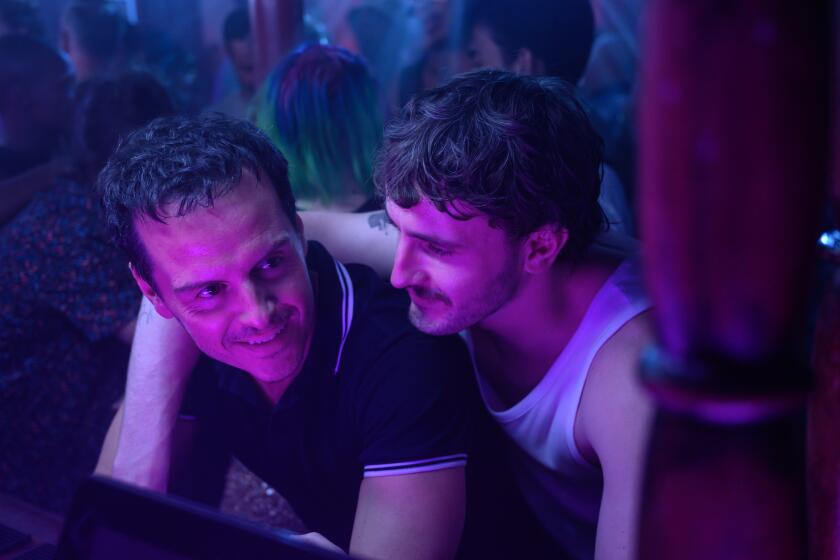Ethan and Maya Hawke and Laura Linney on their maverick Flannery O’Connor biopic ‘Wildcat’

- Share via
TELLURIDE, Colo. — As literary icons go, Flannery O’Connor is hardly the most obvious candidate for a biopic.
The Georgia-born O’Connor is widely revered for her darkly humorous, often grotesque and violent Southern Gothic novels and short stories, including “Wise Blood” and “Everything That Rises Must Converge,” which explore themes of faith, redemption, race and good and evil. But the author, who died in 1964 at age 39 from complications from lupus, spent the last 14 years of her life writing at her typewriter in the same room. Not exactly the stuff of gripping cinematic drama.
O’Connor herself once predicted (wrongly, it turns out) that there would never be any biographies of her, explaining, “Lives spent between the house and the chicken yard do not make exciting copy.”
But director Ethan Hawke‘s latest film, “Wildcat,” which premiered on Friday at the Telluride Film Festival, is not a conventional biopic. Just as O’Connor upended literary expectations, the film — starring Hawke’s daughter Maya as O’Connor and Laura Linney as her sanctimonious mother, Regina — scrambles the genre’s usual formula, interweaving scenes from the author’s life with dramatizations of four of her stories.
In addition to their roles as O’Connor and her mother, Hawke and Linney also play central characters in each of the stories within the film, which thematically and emotionally echo events happening in O’Connor’s life. For three-time Oscar nominee Linney, the film offers another chance to show off her range. For Hawke, 25, who broke out in Netflix’s “Stranger Things” and appeared earlier this year in “Asteroid City,” “Wildcat” marks the most challenging project she’s taken on to date.
The film, which is currently seeking distribution, is a family production. (The Hawkes have secured a SAG-AFTRA interim agreement, allowing the actors to speak about the movie during the strike.) It was Maya’s deep passion for the author and her work that initially sparked the idea, with the elder Hawke signing on to co-write the script with Shelby Gaines and direct. Hawke’s wife and partner Ryan Hawke co-produced the film. (Maya’s mother is the actress Uma Thurman.)
“You don’t have to talk about it anymore — you don’t have to wonder: Yes, I’m a nepo father,” Hawke joked when he introduced the film at the premiere on Friday.
On Saturday, Ethan and Maya Hawke and Linney sat down with The Times to discuss spirituality, creativity, race, father-daughter dynamics and Taylor Swift’s advice on life.
Two films by British directors — Andrew Haigh’s metaphysical gay romance ‘All of Us Strangers’ and Emerald Fennell’s ‘Saltburn’ — debuted the same night.
What was the genesis of this project?
Ethan Hawke: Maya fell in love in her late teens with Flannery O’Connor’s “A Prayer Journal” [a posthumously published collection of private musings on faith and fiction that the author wrote while studying at the Iowa Writers Workshop]. It didn’t just speak to creativity, it was speaking to, when you’re young: What is faith? And why do I do what I do? How am I supposed to live my life? What is my direction? What is my North Star?
Flannery was so obviously magnificent but she was full of so much self doubt. [to Maya] I feel like you saw “A Prayer Journal” as like a talisman of sorts of how to begin a life in the arts. It gave you permission, as a young person, to be like, “Just because I’m doubting myself and worried I’m mediocre, that doesn’t mean I am. Or just because I am right now doesn’t mean I always will be.”
Maya Hawke: The key thing is that, at the beginning, you have to get rid of your desire for other people to recognize you as great. I was with a young person recently, and they said, “My greatest wish is to write the next Great American Novel.” And I thought about Flannery and I was like, “That’s the wrong wish.” It has to be what it’s about, not about the public recognition of the thing. Be specific and be personal and be yourself versus ambition for affirmation.
How did you arrive at the idea of interweaving scenes from O’Connor’s life with scenes from some of her stories?
Ethan Hawke: I had just turned 50 when Maya approached me with this idea about making a movie about Flannery. And something about turning 50 made me incredibly depressed that my inner life, my spiritual life — whatever kind of corny vocabulary words we have for this — I thought so much about it when I was young and here I am 50 years old and I’m still on first base.
Then I had this realization that my discipline, my faith, was rooted in the performing arts and that I wasn’t on first base, that I was manifesting my faith in people and myself in the world and I was exploring it through human creativity. And I thought, well, that’s kind of interesting. And Maya started talking about Flannery and how she was a very serious spiritual person and had dedicated her life to her inner work, and the greatest manifestation of that is in her writing. So I thought, Wow, we could explore her Catholic upbringing, what she’s reading, her development, and do it through her creativity.
I read [O’Connor’s] collected works, and if you read the short stories back to back, there’s kind of this portrait of her that arises. It’s very complex, but through the work, you see the human being. And I thought, well, let’s make a movie about imagination.
Maya Hawke: That’s how you raised me. A dedicated practice in the arts is a dedication of your life. And there’s that famous David Foster Wallace quote about how you have to be very careful about what you worship, because if you don’t have a healthy thing that you worship, you very well may accidentally end up worshiping money or beauty or youth or yourself, and that will destroy you. It just happened very cohesively that the things we were talking about could pour themselves into this little poetic movie.
‘Am I embarrassed to have inflated my own record when my record is pretty good on its own? Yes, it makes me cringe,’ legendary swimmer Diana Nyad told The Times, days before the premiere of ‘Nyad.’
Laura, you’ve known Ethan for a long time and the two of you worked together on Broadway in the early ’90s. Ethan said at the “Wildcat” premiere that, casting you this movie, he knew you would “crush any cuteness of the dad-daughter act that needed to be crushed.” What appealed to you about the project?
Linney: There was no cuteness. There were two unbelievably committed, loving, kind, decent artists digging very deep together. And because they are father and daughter, because they happen to like each other — which many fathers and daughters don’t, you know — there was a trust that was incredibly high and so moving to me because I had it myself.
Then there was also just the work, which is why we want to do it anyway. This desire to create something that is worthy, to explore things that we don’t understand, to learn things about ourselves that we didn’t know existed, the understanding of what art can do to an individual, to a family, to a community, to a culture — all of that was on set with us the whole time. And, you know, I also just knew it would be fun.
There are a lot of funny moments in the film.
Maya Hawke: My favorite part about the screening was hearing people laugh. I thought it was funny but I didn’t know if anyone else was going to think it was funny.
Linney: There’s something about the way humor can tickle the truth of something. It’s a release of recognition. And in some ways, comedy is a way to survive. Comedy is a way to somehow make the unbearable bearable, spiritually. So it’s an important aspect of the movie.
So what was the father-daughter dynamic like on set?
Maya Hawke: Horrible. [laughs]
Ethan Hawke: What I meant by crushing any cuteness out of it was that I have worked with Laura and watched her work, and I know what she does to an environment. Excellence is contagious. I knew Laura would put a ton of thought into this because that’s what she does, and I knew that would be contagious to the two of us.
Maya Hawke: But it was wonderful to work together, all of us. When I have enjoyed my job the most is when it doesn’t feel like: Now I’m at work. When it feels like you can feel the connective tissue of your life in your work. It’s all connected and it’s what gives you a center of gravity in a life that doesn’t have one naturally. So it was a wonderful experience, a continuation of a long of a story that had a lot of characters and a lot of plot lines for all of us.
Ethan Hawke: Laura and I have that continuity because we’ve been watching each other grow and fail and succeed. And Maya and I have that because you know, we grew up together.
Maya Hawke: And are watching each other grow and fail and succeed.
In the last few years, there’s been a re-examination of O’Connor around issues of race in light of how she wrote about it privately when she was young. How did you grapple with presenting a nuanced depiction of her views of race and how they evolved in her life and work?
Ethan Hawke: Hopefully the movie answers that. This is a young person who grew up in the Jim Crow South, and that is her reality. I sometimes think when people are angry with Flannery O’Connor, what they mean is, “I am angry with America.” Because she is a great American artist and full of all the sin that that implies. There’s a great scholar who calls her a “recovering racist.” And America is in recovery from racism.
Linney: Some of America.
Ethan Hawke: Flannery doesn’t write about oppressed people. She doesn’t imagine that she knows what their experiences are. She knows white hypocrisy. And she writes about it because she knows it, meaning she lived it. She’s a part of it. She comes up from it. But if we don’t look at that, as a culture, we can’t see it around us, because it’s still here.
She was allergic to virtue signaling, which makes people really uncomfortable. My favorite line that we put in the movie was: “The truth doesn’t change according to your ability to stomach it.”
Maya, I’m sure you’re getting all sorts of opportunities at this point in your career. Where does a film like this fit with the kind of work you want to do going forward?
Maya Hawke: So far the only thing I’ve learned is that I like doing things I really care about with people I really care about. This fits right dab smack in the middle of that. I like working with people who push me to learn more, whether that’s when I do music and working with musicians who are better than me, or doing this and working with artists and actors who are better than me and have things to teach me.
I aspire to be a lifelong student, and I want to try a lot of different things and make a lot of different things. And I hope that I’m always working with people that are better than me.
I think it’s Taylor Swift who said to Selena Gomez that if you find yourself to be the smartest person in the room, you’re in the wrong room. And I‘d like to take that with me into the rest of my career and continue to try to be the stupidest person in every room that I’m in.
More to Read
Only good movies
Get the Indie Focus newsletter, Mark Olsen's weekly guide to the world of cinema.
You may occasionally receive promotional content from the Los Angeles Times.










